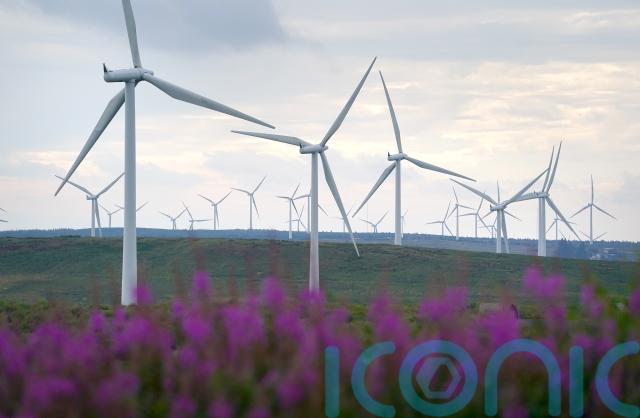
Environmental campaigners are calling on the Scottish Government to curb the demand for imported materials required in the transition from fossil fuels to renewable energy amid concern over human rights abuses committed overseas.
The call comes after a new report commissioned by Friends of the Earth Scotland released today also highlighted the environmental destruction being caused in faraway countries by the mining of lithium for electric car batteries and iron ore to produce steel for wind turbines.
Friends of the Earth Scotland believes the risk that “serious and extensive harm” is being done through the extraction of both materials is currently being ignored by policy makers and continuing to do so could jeopardise the government’s commitment to delivering a “just transition” to renewable energy.
Their report, entitled Unearthing Injustice, states lithium mining in particular has “extensive social and environmental impacts”, citing evidence of human rights abuses wreaked by mining companies and the rights of indigenous people being trampled where mining activities occur.
The paper also points out the process of lithium mining requires high volumes of water in areas where reserves are already stretched and this extra demand can limit supplies of water to local communities and wildlife.

The document states: “Common social issues include loss of land and displacement of communities, loss of livelihoods, food and water insecurities, health impacts, and safety issues for workers.
“Conflicts often arising from these issues include gross human rights
abuses, including murder, torture, forced labour and slavery, threats, gender violence and militarisation.”
The paper goes on to state the mining process also has “considerable” impacts on ecosystems, is a leading cause of deforestation across the globe and generated over 100 billion tonnes of solid waste in 2019.
“Much of this waste is toxic and, in some cases, even radioactive,” the report adds. “Mining waste is usually stored permanently in tailing dams, which are often poorly constructed and maintained.
“The failure rate of tailing dams is estimated to be over 100 times higher than that of conventional water dams.”
With demand for lithium expected to increase dramatically in the run-up to 2040 Friends of the Earth Scotland is now calling on the government to develop demand reduction strategies and focus on creating a more circular economy in which minerals are used as sparingly and efficiently as possible.
Kim Pratt, a circular economy campaigner for the charity, commented: “Transitioning away from fossil fuels is vital for a liveable planet, but we must not create another crisis in doing so.
“Materials like lithium and steel are essential for renewables and electric vehicles, but we can’t ignore the serious harm being caused by their extraction.
“We want to see a Scotland which takes no more resources than it needs and, when resources are taken, it’s done in a way which isn’t harming communities or nature anywhere in the world.
“The overall demand for materials must be reduced by moving Scotland to a circular economy, where materials are reused and recycled rather than being thrown away after one use, and by focusing on public services rather than private ones.
“We simply cannot replace all our current petrol and diesel cars with electric cars like for like – we need better public transport, so we don’t need as many cars overall.
“Scotland could take advantage of the large supply of scrap steel available from within our borders and our low carbon electricity grid to produce some of the greenest steel in the world.
“The Scottish Government urgently needs to create a resource justice strategy to make sure Scotland’s material use is fair and sustainable as soon as possible.”
Andy Whitmore, co-chair of London Mining Network, who researched the Unearthing Injustice paper, remarked: “From the deserts of the Atacama to coke ovens in Nova Scotia, our research exposes the human rights and environmental concerns that lie behind the supply chains for minerals associated with the energy transition.
“As governments focus on perceived scarcity there is not enough attention being paid to addressing those abuses, which a commitment to globally fair transition should entail.
“Proper supply chain due diligence would protect the environment, the rights of workers and of impacted communities, including free, prior and informed consent for Indigenous peoples.”
Jake Simms, co-author of the report, added: “Our research demonstrates the urgent need for a resource justice strategy that delivers justice to workers and communities globally impacted by mineral extraction, processing and manufacturing.
“A resource justice strategy must both drive supply chain justice and minimise mineral demand.
“Delivering supply chain justice means establishing a publicly owned energy company, enforcing strict due diligence standards and a reparative trade policy that ensures communities impacted by extraction are fairly compensated.”
A Scottish Government spokesperson said it welcomed the Unearthing Injustice report and it would consider all its recommendations in detail.
The spokesperson added: “We are committed to bringing forward the Circular Economy Bill before summer recess 2023. This Bill will establish the legislative framework to support Scotland’s transition to a zero waste and circular economy; significantly increase reuse and recycling rates; and modernise and improve waste and recycling services.
“Reducing our reliance on private car use can significantly improve the places we live in and our quality of life, which is why all cars – electric as well as petrol and diesel – are included in our commitment to reduce car kilometres by 20% by 2030.
“We are also exploring wider opportunities to make sure Scotland’s international environmental impact is sustainable, through the development of Scotland’s Environment Strategy.”
Subscribe or register today to discover more from DonegalLive.ie
Buy the e-paper of the Donegal Democrat, Donegal People's Press, Donegal Post and Inish Times here for instant access to Donegal's premier news titles.
Keep up with the latest news from Donegal with our daily newsletter featuring the most important stories of the day delivered to your inbox every evening at 5pm.